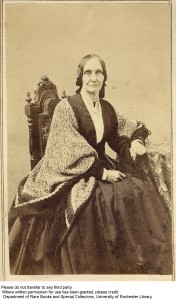
Courtesy of Rare Books and Special Collections
On Thursday, Sept. 13, students and scholars convened in the Hawkins-Carlson Room in Rush Rhees Library to celebrate the launch of an online archive of manuscripts written to and by the Post family, Rochesterians who were deeply involved with many of the city’s progressive movements during the 1800s. Aptly titled “Conversations among Nineteenth Century Revolutionaries,” the compendium is the result of a laborious enterprise primarily undertaken by the Rare Books and Special Collections Department.
According to Manuscript Librarian and Project Co-manager Lori Birrell, Rochester was the mainspring of nationwide social reform. Campaigns for abolition and women’s suffrage were spearheaded by local icons such as Frederick Douglass, Sojourner Truth, Harriet Jacobs and the Post family.
“The Posts were unique in that they were a family of ordinary individuals at the center of a variety of historically significant movements,” Birrell explained. “[They] influenced a tremendous number of people now associated as leaders and American heroes.”
For instance, the Posts operated their home at 36 Sophia St., now Plymouth Avenue, as an Underground Railroad station in antebellum Rochester. An avid reader of Douglass’ antislavery newspaper, the North Star, family matriarch Amy Post engaged in detailed correspondence with escaped slaves, relaying everything she had learned.
Post, a prominent suffragist, also heavily influenced Susan B. Anthony and provided her the initial impetus for entering the women’s rights crusade. Post even lent a hand in organizing the historic Seneca Falls Convention in 1848.
Speaking of the family’s legacy, Associate History Professor Michael Jarvis explained that, “since the Posts were involved in so many different movements rather than one in particular, they wind up being footnoted. Ironically, their sheer amount of activism reflected their commitment to making the world a more perfect place.”
The Post collection includes 2,089 manuscripts, letters and newspapers, Birrell said. To date, the library has digitized over 200 documents, with plans to finish another 200 by December 2012.
Much of the scanning and transcribing has been completed by UR students: juniors Daniel Gorman Jr., Brian Karugira, Jordan Shapiro and Simone Zehren, as well as senior Kelly Veilleux and Brianna Rossetti ’12.
Gorman and Shapiro spoke about their experience at Thursday’s unveiling alongside Jarvis, Religion and Classics Professor Margarita Guillory and Rutgers University professor Nancy Hewitt.
The collection, which had been in UR’s possession since the 1970s, was already annotated and manually indexed. But with the advent of the Internet in the 1990s, Rush Rhees sought to eventually preserve the documents online — a plan that ultimately actualized last year, in part through the charitable contribution of Randall Whitestone ’83 and his wife Lisa.
The papers span an entire century — from 1817 to 1918 — but most were written between the mid-1820s and ’70s. Though the documents largely delineate the family’s role in abolitionism, feminism and Spiritualism, they indicate that the Posts flirted briefly with the anti-tobacco movement, Chinese immigration, public education, Quakerism and the temperance movement.
Birrell articulated her aspirations that UR faculty and students avail themselves of the online archive.
“Digitizing these documents gives the public the opportunity to readily study this fascinating family and its incredible impact on American history through a very local lens,” she said.
“When you physically hold these letters in your hands, you imagine Isaac and Amy Post writing with an iron quill pen in a candlelit room and sending these very letters to Frederick Douglass or whomever. What’s cool is that that’s only half the story,” Jarvis said, providing his own nostalgic take on the Post papers project.
By posting the collection online, he explained, “These letters are now taking new journeys to readers around the world … and that’s the real magic.” To view the archive, visit rbsc.library.rochester.edu/post.
Gould is a member of the class of 2014.

